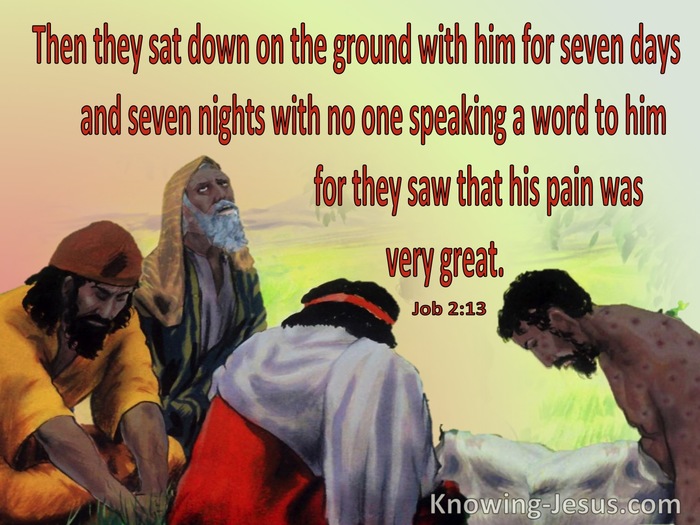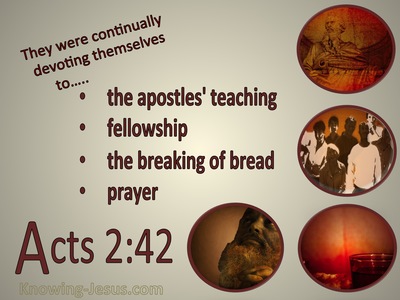◄ What Does Job 2:13 Mean? ►
Then they sat down on the ground with him for seven days and seven nights with no one speaking a word to him, for they saw that his pain was very great.
Job 2:13(NASB)
Verse of the Day
In the first couple of chapters of Job, we witness two unfounded attacks by Satan on a God-fearing man called Job. The first was an assault on his family and possessions while the second affected his physical body and health. We are permitted a peep behind the heavenly scene, where this man, who was justified in the eyes of God by faith, became the target of Satan's accusations.
God permitted the accuser of our soul to test the integrity of His servant which resulted in a shocking attack on Job's family, his body, and his reputation. This unprecedented assault left this God-fearing man bereft of his family, stripped of his wealth, despised by his wife, physically afflicted, a social outcast from his community, and totally unrecognisable.
Despite this unparalleled onslaught, Job maintained his integrity and would not accuse God of evil against him: "Shall we indeed accept good from the Lord and not accept adversity?" was this man's honourable response. And in all this, Job did not sin against God with his lips.
The prologue sets the stage for the entire dialogue that would follow, but only the reader knows the reason behind Job's suffering. All the other actors in the story, including the men who came to comfort their friend, are unaware of the conversation that took place in heaven between the Lord and His adversary, Satan.
The drama continues with the entrance of three men, who, having had heard of Job's misfortune, join forces to comfort their friend. However, they remain ignorant of the spiritual exchange between God and Satan. His three comforters incorrectly assume that Job's misfortune was due to his sinfulness and that he was being punished for his wickedness!
These men were so shocked at Job's unprecedented misfortune and dishevelled appearance that they wept aloud, tore their robes, and covered themselves in dust and ashes, as was the custom of the day. Then we read: "They sat down on the ground with Job for seven days and seven nights with no one speaking a word to him, for they saw that his pain was very great."
Whether they sat in silence as a sign of mourning for the 'loss' of their friend at his deathly appearance or whether their silence indicated their pity, sympathy, horror, grief, or a form of contempt towards their friend because of his situation, we are not told. It could have been courtesy that caused them to wait until their grieving friend began the conversation or simply that this was the practice of the times in which they lived.
We are not told what went through the minds of these three men during their seven days and nights of silence, but as the drama unfolds, we discover a range of biased attitudes in the mind of each person. They had an incomplete understanding of the reason for Job's trials, and their conclusions were diametrically opposite of the truth!
Eliphaz was a man with strong opinions which would have been formed by things he had seen, or heard, or hatched from his own fertile imagination. He was a man who showed that he favoured his own insufficient philosophy of life, rather than trusting the wisdom and truth of God.
Bildad exhibited a strongly religious bias. He held fast to past traditions and religious rationality. He considered the voice of reason was found in the philosophical platitudes of ancient sages or pious proverbs, developed over time from old wives' tales. He was a man who paid greater heed to his own flawed feelings in preference to the truth.
Zophar showed himself to be a traditional legalist who was both opinionated and dogmatic in his monologues, and who considered himself to be super-spiritual. He presumptuously presents himself as a man who is speaking for God Himself, and who was the proud possessor of hidden knowledge from which others were excluded!
It is only as the story of Job unfolds that the chinks in their armour are exposed, as their words of instruction identify them as self-opinionated men who are increasingly ignorant of God's plans and purposes.
Although these men are no doubt genuine friends who believed in God and were well-acquainted with Job as a respected member of their society, we also start to recognise a critical, carnal attitude developing, as they present their opinions to him without recourse to the truth.
Even in the early stages of the drama, we recognise that Job's suffering attracted friends who preferred to gloat over his pain rather than fulfilling the role of a godly comforter and true friend who draws close to a suffering brother and fulfils the law of Christ: "Bearing one another's burdens."
Perhaps by waiting until Job opened the conversation, these friends allowed criticism to override compassion which set the stage for their long, opinionated accusations. Perhaps they came to comfort their friend but allowed human wisdom and worldly philosophies to influence their counsel.
Perhaps if these comforters been spirit-filled counsellors who listened to Job's pain rather than becoming prosecuting attorneys, their interaction with their friend may have been different and we would not have gained so great an understanding of the spiritual war continuously raging in heavenly places, or the way God deals with man in the heavenly realm.
Instead, we gain a greater understanding of the importance of prayer, the nature of God, the reason behind much human suffering, and how the Lord deals graciously with His servants. May we learn the many spiritual lessons presented in the drama of Job, avoid the mistakes of his critical comforters, and in everything fulfil the will of God in our lives.
My Prayer
Heavenly Father, thank You for friends who will sit with me through times of grief. Help me to realise that sometimes I don't need to offer lots of chatter to help someone, but just being there for a friend in need may be the best for them. Thank You that You work all things together for good for those that love You and that no matter what sufferings I may have to undergo in this fallen world, You will use it to teach me more of Your character and more about myself. Keep me from engaging in human wisdom or allowing worldly philosophies or legalistic tendencies to adversely influence my understanding of Your plans and purposes. And help me to hold fast to my integrity, like Job, when I do not understand why difficulties have arisen in my life. This I ask in Jesus' name. AMEN.
Choose a Verse from Job 2
Job 2:13 Further Study
- Job 2:13 in the Parallel Bible
- Job 2:13 in the Thematic Bible
- Job 2:13 Cross References
- Job 2:13 Treasury of Scripture Knowing
- Job 2:13 Sermons
- Job 2:13 Prayers
- Job 2:13 Images
- Choose Chapter
Never miss a post















